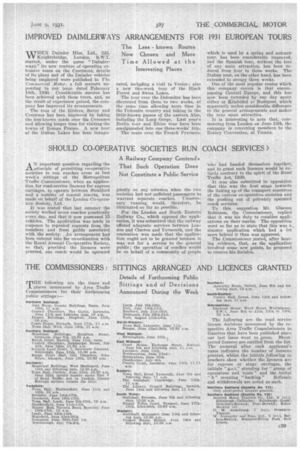SHOULD CO-OPERATIVE SOCIETIES RUN COACH SERVICES?
Page 61

If you've noticed an error in this article please click here to report it so we can fix it.
ANimportant question regarding the principle of permitting co-operative Societies to run coaches arose at last week's sittings of the Metropolitan Traffic Commissioner, when an application for road-service licences for express carriages, to_ operate between Stratford and a 'number of 'coastal resorts, Was made on behalf of the London Co-operative Society, Ltd.
It was stated that last suminer the society worked seven coaches practically every day, and that it now possessed 15 vehicles. The application was made in response to repeated requests from the members end from guilds associated with the society. An arrangement had been entered into for co-ordination with the Royal Arsenal Co-operative Society, so that, provided the licences were granted, one coach would be operated
jointly on any occasion when the two -societies had not sufficient passengers to 'warrant separate coaches. Unnecessary running would, therefore, be eliminated so far as possible.
For the London and North Eastern Railway Co., which Opposed the application, it was submitted that the' railway offered adeqimte services lietWeen London and Clacton and Yarmouth; and the contention -was made that the application ought not to be granted because it was not for a service to the general public ; the operation of coaches would be on behalf of a community of people who had banded themselves together, and to .grant such licences would be entirely contrary to the spirit of the Road Traffic Act,1930.
It .was also submitted in opposition that this was the first stage towards the linking up of the transport resources Of the varidus cooperative societies and the pushiug out of privately operated coach services.
To this. e. Mr. Gleeson Robinson, the Commissioner, replied that it was his duty to consider applications on their merits. The opposition went so far as to state that this was a„ sinister application which had a lot more behind it than was apparent.
The Commissioner stated, after hearing, evidence, that, as the application involved some new points, he proposed to reserve his decision.












































































































